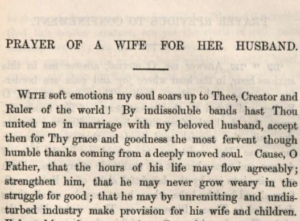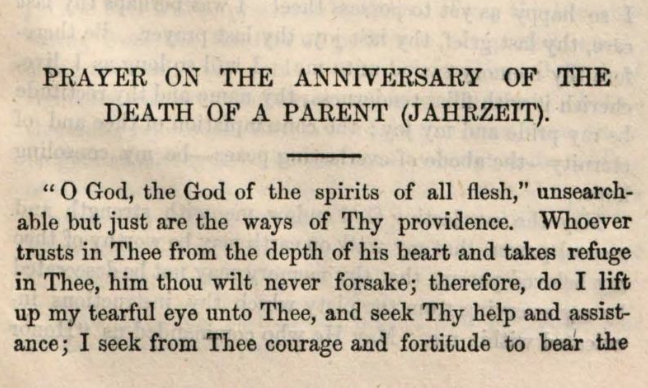| Contribute a translation | Source (English) |
|---|---|
With soft emotions my soul soars up to Thee, Creator and Ruler of the world! By indissoluble bands hast Thou united me in marriage with my beloved husband, accept then for Thy grace and goodness the most fervent though humble thanks coming from a deeply moved soul. | |
Cause, O Father, that the hours of his life may flow agreeably; strengthen him, that he may never grow weary in the struggle for good; that he may by unremitting and undisturbed industry make provision for his wife and children. | |
Exhort him when temptation allures him to stray from the path of Thy paternal grace; | |
protect him from the vile machinations of the evil disposed, lest they draw him into the webs of their vicious circle, | |
grant him patience and forbearance with my womanly weakness, so that his love may never yield to anger and strife; | |
may there ever dwell within us the spirit of wisdom and virtue, of industry and of joyous zeal, of discipline and order, of forbearance and benevolence, of piety and morality, of harmony and confidence. | |
O, eternal God of hosts! be with him in all his ways, bless him in his going out and in his coming in, bless all his undertakings from this day and evermore. Amen. |
“Prayer of a Wife for her Husband” by Marcus Heinrich Bresslau was first published in his תחנות בנות ישראל Devotions for the Daughters of Israel (1852), p. 57.
In his preface to Devotions, Bresslau is clear that his prayers in English were adapted from traditional teḥinot that had earlier been published in France, Germany, and Poland. If you know of a specific prayer that may have served as the basis for this one, please leave a comment or contact us.
Source(s)


“Prayer of a Wife for her Husband, by Marcus Heinrich Bresslau (1852)” is shared through the Open Siddur Project with a Creative Commons Public Domain Dedication 1.0 Universal license.










Leave a Reply